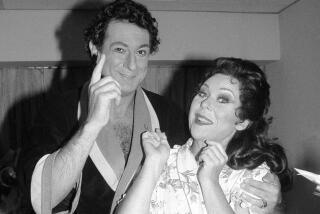Music : Soprano Mirella Freni in Exemplary Recital at the Ambassador
In wonderful voice, and gracious to a fault, Mirella Freni returned to Ambassador Auditorium after a seven-year absence Saturday night and gave thrills to a sold-out audience in the 1,200-seat hall.
The veteran Italian soprano did nothing unexpected in this belated return.
Her program was half Italian and half Russian, and the combination seemed to please her adoring fans, who gave her an extended round of applause before she sang a note, and several lengthy ovations later in the evening.
This agenda--from Gluck and Mozart through Rossini, Boito and Verdi, and ending with Rachmaninoff and Tchaikovsky--had cogency and variety in its favor, and did not seem to tax the singer.
Decades of stardom, no doubt, have made Freni a relaxed performer. On this occasion, she did not work hard, or seem to strain. Her singing remains beautifully focused, untroubled.
The secret of her longevity may be that very relaxation: In most of this exemplary performance, the soprano showed little involvement with the material at hand. She tended to little details--not always textual details, but never mind--and to the longer line, and let the music shape itself, which it often can do.
But she projected little of herself along with the handsome tone she usually produces. And she seems to know that, in giving less than total dedication to the recitalist’s task, she is still giving enough to make an audience happy.
There were good reasons to be happy here. Well-wrought, if not exactly pointed, performances of “O del mio dolce ardor” and of Susanna’s aria from “Nozze di Figaro,” began the proceedings. Four Rachmaninoff songs and the letter scene from “Evgeny Onegin” closed it.
In between were non-operatic songs by Rossini and Verdi and “L’altra notte,” from “Mefistofele.” A few flat, or strident, or inconsistent moments aside, all were carefully sung.
After the Tchaikovsky aria, Freni took two of the same encores she had given in 1983, “Io son l’umile ancella” from “Adriana Lecouvreur” and “O mio babbino caro,” from “Gianni Schicchi.”
As she had on that earlier occasion, pianist Paola Molinari provided always competent, usually faceless accompaniments.
More to Read
The biggest entertainment stories
Get our big stories about Hollywood, film, television, music, arts, culture and more right in your inbox as soon as they publish.
You may occasionally receive promotional content from the Los Angeles Times.










